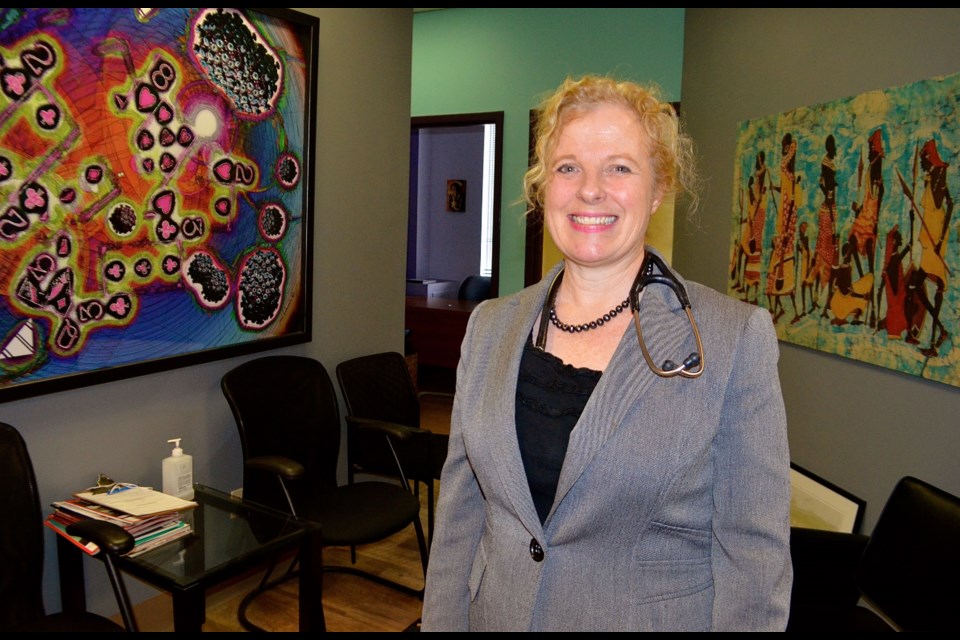Dr.Anne-Marie Zajdlik learned a lot about the impact of stigmatization as a young medical student treating one of Canada’s first diagnosed HIV positive patients.
“I went to Dalhousie in Halifax to do an elective in infectious disease and I just so happened to be in the room when the first dose of the first HIV drug was given to the first patient in the country,” said Zajdlik. “I didn’t even know what HIV was, but it was one of those moments where you know the direction of your life has just shifted.”
Zajdlik spent about an hour every day monitoring the patient’s response to the medical treatment as well as the type of treatment he was receiving from people fearful of the disease.
“He was a homosexual man who was abandoned by his partner and his family,” she said. “People were terrified so nursing staff wouldn’t go into the room, housekeeping wouldn’t clean his room and dietary left his tray outside the room. I was stunned that I was watching a situation where a person could be this stigmatized and this alone with a disease that was going to kill him, and he did eventually die.”
The relatively short amount of time Zajdlik spent with him would impact the rest of her life and the life of countless others.
“His name was Chris and he inspired me to head back to McMaster University, where I was a second-year medical student, and learn as much as I could about HIV,” said Zajdlik. “So, that was the beginning of that direction of my career.”
Zajdlik has dedicated more than 30 years of her life treating and advocating for HIV positive patients in Guelph-Wellington, Grey Bruce and Waterloo Region and became the driving force behind a campaign to end an AIDS pandemic halfway around the world in sub-Saharan Africa.
“I inspired Guelph to help me raise $1 million for the first HIV clinic in Lesotho,” said Zajdlik. “The problem there was wiping out entire populations. A third of the population was dying.”
The Bracelet of Hope campaign, launched in 2006, raised the needed funding to keep the Tsepong Clinic in Lesotho operating through 2009 where it provided life-saving treatment for more than 11,000 people.
“That is Guelph’s claim to fame,” said Zajdlik. “Guelph did that and many of those 11,000 people are still alive today because of that effort.”
Zajdlik has received a number of awards for her work including honorary doctorates from McMaster University and the University of Guelph, the Order of Ontario, the Queen Elizabeth II Diamond Jubilee Medal and the Governor General’s Meritorious Service Medal but her motivation is a bit more Hippocratic.
“It is the physician in me,” she said. “I am from small town Ontario. I was raised by Roman Catholic parents. I have a strong faith and my faith says you’re supposed to help other people. It’s using the skill set I have, to do what I was wired to do.”
Zajdlik was born in St. Catherines and moved to Guelph in 1982 to study biomedical sciences at the University of Guelph.
“I was getting ready for med school,” she said. “This is where I met my husband Barry. We were 20.”
They now have three adult children Adam, Samuel and Elise.
Zajdlik went on to McMaster to get her medical degree and that is when she completed the life-changing, infectious diseases elective in Halifax.
“That was 1987 and I went back to Hamilton and learned as much as I could about HIV from a physician, Stephan Landis, who had just opened one of the first clinics in the country,” she said “Stephan taught me all I could learn about HIV at that stage.”
Zajdlik moved back to Guelph in 1990 and connected with the AIDS Service Organisation.
“I asked if I could help with any of their HIV positive patients and they looked at me like I had two heads,” she said. “There’s been a real shift in medicine but 30 years ago health care workers avoided working with stigmatized populations.”
Zajdlik eventually partnered with the AIDS Service Organisation to form HIV/AIDS Research and Community Health or ARCH in 2005. That same year she started the Masai Centre for Local, Regional and Global Health.
“We went from having seven patients to 700 patients at our peak,” she said. “It fluctuates as people move in an out of the community. There are four physicians that help me manage that clinic.”
Bracelet of Hope is now focused on helping children in Lesotho orphaned by AIDS and have partnered with a Swiss organisation called SolidarMed to provide mobile health units that can reach populations in remote parts of the country.
“We are partnering with them to provide the funds and some of the expertise to help roll out six new mobile health units,” said Zajdlik. “I think we need about 30 of these mobile health units to end the pandemic in Lesotho.”
The success of the Bracelet of Hope campaign has helped confirm Zajdlik’s belief in the basic goodness of people and what can be accomplished when we end stigmatisation and people work together to solve the problems in the world.
“I was very humbled by it, but I think we are wired to do good things,” she said. “We are wired to solve our own problems and the problems of other people. It was more a matter of someone saying here is an opportunity to help, in a really big way, people that are in great need. Would you like to jump on the bandwagon?”

.png;w=120;h=80;mode=crop)

